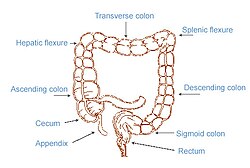| Neurogenic bowel dysfunction | |
|---|---|
| Other names | Neurogenic bowel |
 | |
| The image shows the 4 parts of the colon (ascending, transverse, descending and sigmoid) and the rectum. Feces are transported along and stored in the rectum before excretion. | |
| Specialty | Gastroenterology |
Neurogenic bowel dysfunction (NBD) is reduced ability or inability to control defecation due to deterioration of or injury to the nervous system, resulting in fecal incontinence or constipation.[1] It is common in people with spinal cord injury (SCI), multiple sclerosis (MS) or spina bifida.[2]
The gastrointestinal tract (GI tract) has a complex control mechanism that relies on coordinated interaction between muscular contractions and neuronal impulses (nerve signals).[3] Fecal incontinence or constipation occurs when there is a problem with normal bowel functioning. This could be for a variety of reasons. The normal defecation pathway involves contractions of the colon which helps mix the contents, absorb water and propel the contents along. This results in feces moving along the colon to the rectum.[4] The presence of stool in the rectum causes reflexive relaxation of the internal anal sphincter (rectoanal inhibitory reflex), so the contents of the rectum can move into the anal canal. This causes the conscious feeling of the need to defecate. At a suitable time the brain can send signals causing the external anal sphincter and puborectalis muscle to relax as these are under voluntary control and this allows defecation to take place.[4][5]
Spinal cord injury and other neurological problems mostly affect the lower GI tract (i.e., jejunum, ileum, and colon) leading to symptoms of incontinence or constipation. However, the upper GI tract (i.e., esophagus, stomach, and duodenum) may also be affected and patients with NBD often present with multiple symptoms.[6][7] Research shows there is a high prevalence of upper abdominal complaints, for example a study showed that approximately 22% of SCI patients reported feeling bloated,[6][8] and about 31% experienced abdominal distension.[6][9]
- ^ "Sample records for neurogenic bowel dysfunction". science.gov. Science.gov. Archived from the original on 2018-09-29. Retrieved 2018-09-28.
- ^ Emmanuel, A (2010-02-09). "Review of the efficacy and safety of transanal irrigation for neurogenic bowel dysfunction". Spinal Cord. 48 (9): 664–673. doi:10.1038/sc.2010.5. PMID 20142830.
- ^ Brookes, SJ; Dinning, PG; Gladman, MA (December 2009). "Neuroanatomy and physiology of colorectal function and defaecation: from basic science to human clinical studies". Neurogastroenterol Motil. 21: 9–19. doi:10.1111/j.1365-2982.2009.01400.x. PMID 19824934. S2CID 33885542.
- ^ a b Palit, Somnath; Lunniss, Peter J.; Scott, S. Mark (2012-02-26). "The Physiology of Human Defecation". Dig Dis Sci. 57 (6): 1445–1464. doi:10.1007/s10620-012-2071-1. PMID 22367113. S2CID 25173457.
- ^ Krogh, K; Christensen, P; Laurberg, S (June 2001). "Colorectal symptoms in patients with neurological diseases". Acta Neurol Scand. 103 (6): 335–343. doi:10.1034/j.1600-0404.2001.103006335.x. PMID 11421845. S2CID 28090580.
- ^ a b c Qi, Zhengyan; Middleton, James W; Malcolm, Allison (2018-08-29). "Bowel Dysfunction in Spinal Cord Injury". Curr Gastroenterol Rep. 20 (10): 47. doi:10.1007/s11894-018-0655-4. PMID 30159690. S2CID 52129284.
- ^ Nielsen, S D; Faaborg, P M; Christensen, P; Krogh, K; Finnerup, N B (2016-08-09). "Chronic abdominal pain in long-term spinal cord injury: a follow-up study". Spinal Cord. 55 (3): 290–293. doi:10.1038/sc.2016.124. PMID 27502843.
- ^ Ng, Clinton; Prott, Gillian; Rutkowski, Susan; Li, Yueming; Hansen, Ross; Kellow, John; Malcolm, Allison (2005). "Gastrointestinal Symptoms in Spinal Cord Injury: Relationships With Level of Injury and Psychologic Factors". Dis Colon Rectum. 48 (8): 1562–1568. doi:10.1007/s10350-005-0061-5. PMID 15981066. S2CID 22026816.
- ^ Coggrave, M; Norton, C; Wilson-Barnett, J (2008-11-18). "Management of neurogenic bowel dysfunction in the community after spinal cord injury: a postal survey in the United Kingdom". Spinal Cord. 47 (4): 323–333. doi:10.1038/sc.2008.137. PMID 19015665.
© MMXXIII Rich X Search. We shall prevail. All rights reserved. Rich X Search
